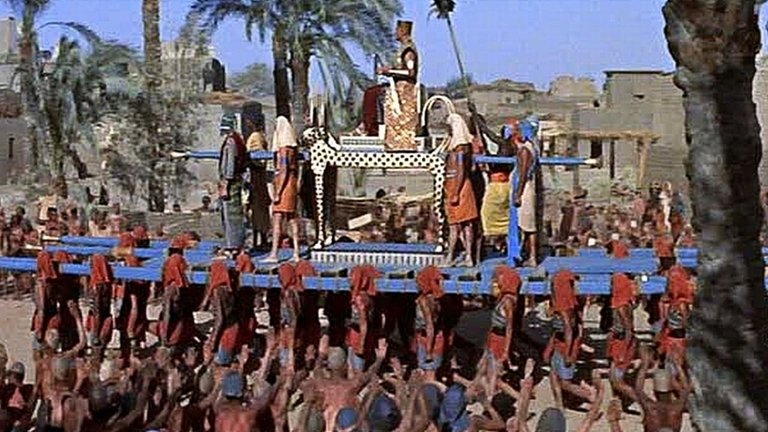Film Review: Land of the Pharaohs (1955)

The realm of great artistry is often marked by subjectivity, and this attribute is particularly evident in the case of Howard Hawks' 1955 historical epic, Land of the Pharaohs. Despite being widely regarded as one of the classics of the genre today, Hawks himself considered the production to be an abject failure.
Set in ancient Egypt during the Old Kingdom era (26th Century BC), Land of the Pharaohs tells the story of the Fourth Dynasty under the rule of its most illustrious pharaoh, Khufu (also known as Cheops, played by Jack Hawkins). Having returned from a victorious military campaign in the Levant with an abundance of gold and captive slaves, Khufu becomes obsessed with ensuring that his vast wealth is preserved for him to enjoy in afterlife. Fearing that his tomb may be plundered, he turns to Vashtar (played by James Robertson Justice), a talented architect among the captives, who proposes a solution: an elaborate mechanism to permanently seal the tomb with impenetrable blocks of stone. The tomb is to be contained within massive massive pyramid and Khufu starts to build it. This colossal endeavor takes decades to complete and places a tremendous burden on the nation. However, the project's progress is threatened when Khufu falls under the spell of Nellifer (played by Joan Collins), a beautiful Cyprian princess and envoy who seduces him, becomes his second wife, and subsequently seeks to claim all of her husband's treasures for herself.
Land of the Pharaohs was one of the grand "larger-than-life" epics that utilised improved colour film and Cinemascope for widescreen picture format, providing an immersive experience that helped Hollywood studios compete with the emerging threat of television. Hawks, known for his diverse directorial work, enthusiastically embraced this challenge, resulting in a visually impressive production that reconstructed ancient Egypt with meticulous care and conviction. The famous Cinecitta studios in Rome and authentic Egyptian locations were used, with nearly 10,000 extras (mostly provided by the Egyptian Army) at the director's disposal. Hawks made excellent use of these resources in the first part of the film, in the scene showcasing elaborate processions and the actual construction of the pyramid.
The film also benefits from a superb soundtrack by famed composer Dmitri Tiomkin, who drew inspiration from various exotic folk traditions and ancient sources to create music that is both epic and otherworldly. While some hair-splitting history buffs may take issue with the lyrics of the vocal parts being gibberish, this minor drawback can be forgiven given the time period in which the film was made and the lack of understanding of what Egyptian language from 4500 years ago sounded like.
One aspect that sets Land of the Pharaohs apart from other 1950s "sword-and-sandal" epics is its plot, which is set in one of the earliest periods of recorded history. By eschewing references to Judaism and Christianity altogether, the audience is fully immersed in the exotic world of Ancient Egypt, with the film taking its customs, mindset, and religion very seriously.
Unfortunately, while Hawks' directorial skill is evident throughout, the script authored by three writers leaves something to be desired. The first part of the film introduces viewers to ancient Egypt, followed by a second half that descends into generic melodrama and palace intrigue. This lacklustre narrative is further compromised by some unfortunate casting choices.
Joan Collins, in her first major role, displays a talent for playing villainous characters that would serve her well in her later iconic role as Alexis in Dynasty. However, her performance here is somewhat marred by being slightly overweight – something that was made more apparent by revealing costumes and that reportedly angered Hawks and prompted him to consider firing her from the set. In her memoirs, Collins blamed her weight gain on an excess of Italian pasta and lack of discipline at that stage of her career.
Hawks' lack of enthusiasm for Land of the Pharaohs can be explained not only by difficulties on the set but also by the disappointing reception of his work. The film actually represented Hawks' first major box office flop, accompanied by mostly lacklustre reviews. Some of the reasons for this can be seen in the film being relatively short for 1950s epic cinema standards and having relatively little action. Hawks was actually so taken aback by this failure, that he took sabbatical from film making and took few years travelling in Europe before triumphant return to form with classic Western Rio Bravo.
Despite this setback, Land of the Pharaohs has found its admirers among film critics and scholars. Some, most notably in France, have praised the film as a bold and uncompromising venture into uncharted territory, embodying the principles of the Auteur Theory. One of the film’s most prominent admirer is Martin Scorsese, who, while acknowledging some of the its shortcomings, often cites it as one of the most important inspirations for his own work.
RATING: 7/10 (+++)
Blog in Croatian https://draxblog.com
Blog in English https://draxreview.wordpress.com/
InLeo blog https://inleo.io/@drax.leo
Hiveonboard: https://hiveonboard.com?ref=drax
Rising Star game: https://www.risingstargame.com?referrer=drax
1Inch: https://1inch.exchange/#/r/0x83823d8CCB74F828148258BB4457642124b1328e
BTC donations: 1EWxiMiP6iiG9rger3NuUSd6HByaxQWafG
ETH donations: 0xB305F144323b99e6f8b1d66f5D7DE78B498C32A7
BCH donations: qpvxw0jax79lhmvlgcldkzpqanf03r9cjv8y6gtmk9
Posted Using InLeo Alpha